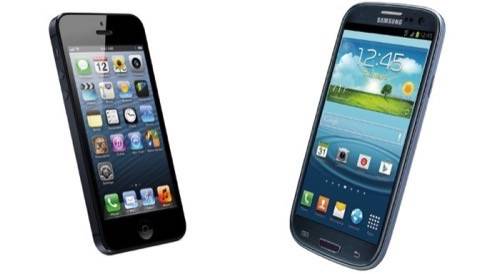
Today is the big launch of Samsung’s flagship Galaxy S4 smartphone — and Apple has clearly taken notice. Earlier this week, Apple released two new iPhone commercials, which were well-crafted if boring. It is unlikely the timing of these new ads was coincidental.
Yesterday, Apple marketing chief Phil Schiller gave a rare interview to the Wall Street Journal. Schiller was clearly on the attack.
Schiller insisted that surveys reveal that iPhone users are more “satisfied” with their device than Android users. Schiller mentioned that Android is plagued by fragmentation and that Android users are often running outdated versions of the operating system.
Schiller wasn’t finished:
Android is often given as a free replacement for a feature phone and the experience isn’t as good as an iPhone.
While Apple’s advertising focuses almost exclusively on its own product, Schiller spent much of his time with the Wall Street Journal knocking Android.
When you take an Android device out of the box, you have to sign up to nine accounts with different vendors to get the experience iOS comes with. They don’t work seamlessly together.
While Schiller mostly talked Android, Samsung was clearly on his mind. For example, he took a swipe at Samsung and its larger-sized Galaxy displays, suggesting that the bigger screen is necessary to mask a larger battery with which to compete with the iPhone 5’s battery life.
Schiller even disputed the recent smartphone market share numbers, touted the claim that Android users are more likely to switch to iPhone, and stated:
I’m not sure that the estimates and the modeling accurately gives an accurate picture of it all.
There is good reason for Schiller to be concerned, at least with Samsung, if not Android. According to the most recent comScore figures, Apple has a 38% share of the US smartphone market. Samsung is second, with 21%. But according to mobile analyst, Tomi Ahonen, Samsung is the clear global smartphone winner — having sold 215 million devices in 2012, compared to Apple’s 136 million.
The disparity could grow throughout the year. Samsung has recently stated that its flagship Galaxy line has sold over 100 million units since its May 2010 launch and that it expects to sell over 300 million smartphones in 2013.
Another point of concern for Apple: Samsung has been outspending Apple on advertising. Samsung spent $401 million just in the U.S. last year to promote its smartphones. Apple spent $333 million. Just as important, Samsung’s advertising has been more impactful. As ReadWrite noted this week, Samsung’s commercials “are the kinds of ads that strike a chord.”
Apple remains the leader, however, where it may matter most: profits. As we noted last week, “Samsung is winning every way but one” against Apple. That one way, of course, is profits. Nonetheless, Apple clearly is watching Samsung carefully — and isn’t above having the likes of Schiller toss a brushback pitch from time to time.

















